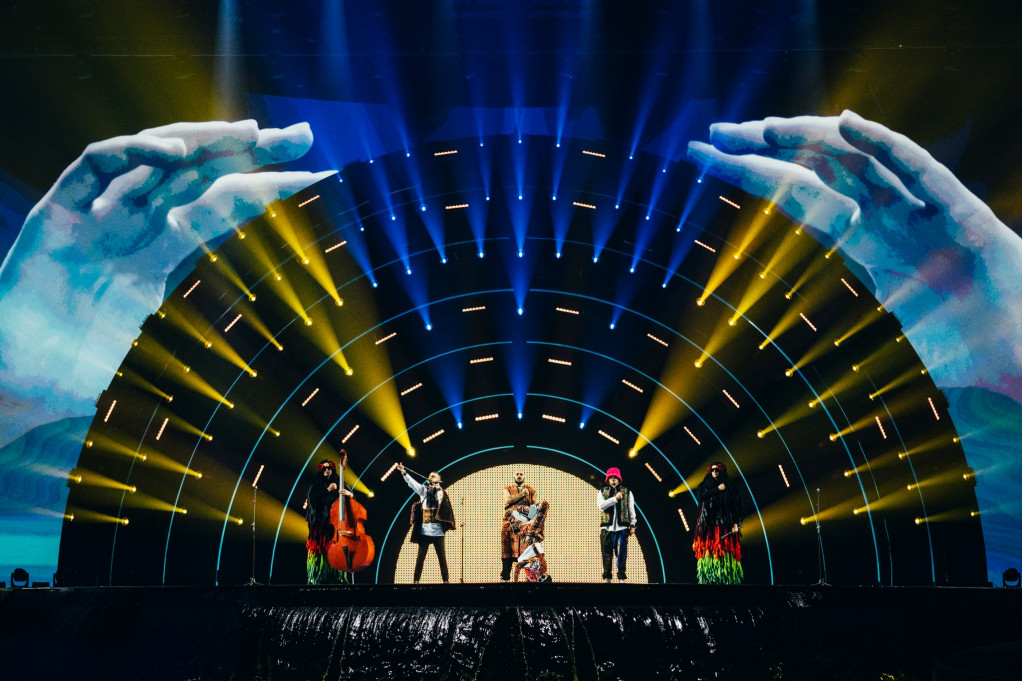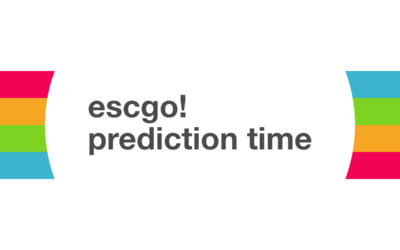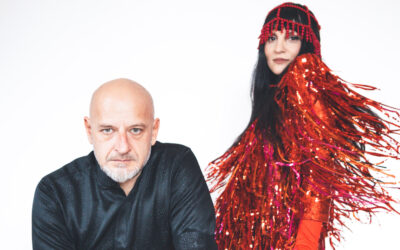Every year, there are two weeks in May where the space/time continuum decides to do its own thing. Times moves faster for a few days, then slows down for a bit, then moves faster again before getting to the final 24 hours of that period and just crawling. Those are the two weeks that precede the Eurovision Song Contest, and the first warning ahead of the continuum returning to normal is the sound of the Te Deum playing on many screens across the world. A few hours later, when the second Te Deum sounds, the continuum resets itself and returns to its normal functionality until the following year.
We’re now inside those 24 hours, and there’s not much we can do except count down the hours, minutes and seconds. And overthink. A lot.
If you read this and thought: “Shi, you ALWAYS overthink things”, you’d be absolutely correct. But the overthinking of the last 24 hours is a very unique mutation of the standard overthinking, as it is greatly impacted by oversaturation (at least to some degree) of all the entries, on top of already having come up with approximately a thousand previous thoughts and not getting enough sleep.
It’s obviously not going to stop me, but I will attempt to keep that in mind as I send some last thoughts into the universe ahead of tonight’s Eurovision final, which – however it ends – will be something that we’ve never had before.
Finding out who our new Eurovision winner is aside, one of the things that I always look forward to in a final is finally getting answers to so many of my questions. As we discover the votes from the juries, and later the televote, we begin to sort the year into the piles of the predictable and the surprising, even when for some we might already have a sense of where it’s going. Will we see any of the first few songs making a dent on the scoreboard? It feels unlikely, but never say never.
There are many songs which qualified from both semis that very much feel like jury songs. Was any of them actually more of a televote song? Or both? Curious minds – well, my mind – want to know.

Don’t you еver dare to wear my Johnny Cash t-shirt
(EBU / Sarah Louise Bennett)
How will Serbia do? It felt like a wildcard before the semi-final, but with hours to go until the final it seems to be one of those few wonderfully unexpected surprises that happen every year, if we’re lucky. And what about the up-tempos? In a field that has very few crowd-pleasers of that sort, who will fare better? Norway, which I thought was a safe enough bet since it was picked, or Moldova, with a dreamy running order position in the middle of all the second half ballads? An oasis in the desert, that one.
And then, of course, we have Spain. Chanel, despite being a big 5 performer, has managed to build quite a momentum for herself, and I want to know how it ends. It’s weird to think that somewhere in Europe there are a few people who already know how the juries voted and they have a better idea (or at least a better guess) of where this is going, but it’s a spoiler-free zone for the rest of us.

Shady Lady, I’m gonna strike like thunder
(EBU / Corinne Cumming)
Speaking of Chanel, can we talk about the Big Five Eurovision Miracle of 2022, in which all entries from the big 5 are actually – gasp – interesting? Yes, even Germany, who regardless of its upcoming result actually ended up molding Rockstars into a credible, competent package performed extremely well by Malik Haris, if the semi-final performance of it is anything to go by. Unfortunately for them it’s exactly the wrong year for something like this, although it will definitely be fascinating to see where the many male soloist songs end up on the scoreboard.

You got in my head, boy, like a song that I kept on singing, all along
(EBU / Corinne Cumming)
France is very unlikely to repeat last year’s result or be anywhere close to it, and I don’t think it’s far-fetched to assume it’s not going to be the juries’ cup of tea (or champagne) based on past experience of what happens when juries and ethnic music meet. But it’s such a different thing to have – in all of its charming and slightly amateur glory – in this year’s line-up, especially from France, that I really hope people at home respond to that.
Italy has been out of the top 10 only twice since its return in 2011, so having them on the list of possible candidates to do well isn’t particularly shocking at this point. But having the United Kingdom there, together with Spain, is – even as a theoretical possibility – more shocking than having a top 2 of Italy and France last year.

If your world is breaking and growing up is getting old, know that you’re worth saving and getting up is all you’ve got
(EBU / Corinne Cumming)
If it was a normal year, this would be the place where I’d make the somewhat unthinkable call of saying I think UK and Spain are our #1 and #2 of the night, being the only two I can imagine doing very well with both the televoters and the juries.
But it’s not a normal year, so it might or might not be enough, although even the fact I’m fairly certain that both of them will end up in the top 5 regardless is already sheer madness. For two countries whose average placement in the last ten editions was 20-21 to be in contention in the same edition, a lot of stars had to align in a very specific way, and who knows what shady deals those stars had to agree to if it actually happens.

I can, I will, I know I can
(EBU / Corinne Cumming)
It’s not a normal year, however, and therefore there can’t really be a preview post of the final without talking about Ukraine.
On the most basic level, knowing what is going on there, seeing what we’re seeing, it’s a good reminder for me to maintain some perspective. Whatever happens, it’s just a song contest. One with a rich history that I have also have much personal history related to, but still: a song contest. It’s also generally a good thing to remember, especially if Ukraine does end up winning it all tonight. In the grand scheme of things, it will be a small drop in the bucket that is their lives right now, but a much larger corner of temporary escapism and something to be happy about.
This train of thought is what – in part – makes so many people believe Ukraine will win, and that many people – not just the massive amount of refugees who have settled all over Europe – will vote for it. And it’s hard to fault anyone for caring or for trying to find a small way to show some support during this ongoing heartbreaking horror.
Having said that, tonight is also going to be a very important test for the competition and the values and ideas it is supposed to represent. One of the EBU’s favorite words is “disrepute” and they have a comprehensive list of “don’ts” to avoid bringing Eurovision into disrepute. It can something small or something on a larger scale. It can be mentioning a social network’s name in your song, or including the words “Put” and “In” in your song title. San Marino had to change their lyrics, and Georgia ended up withdrawing, all in the name of not bringing the competition into disrepute.
When Russia was – understandably – disqualified this year, the EBU cited “… concern that, in light of the unprecedented crisis in Ukraine, the inclusion of a Russian entry in this year’s Contest would bring the competition into disrepute.”
With this principle of not bringing the competition into disrepute encompassing such a wide range of possibilities, it’s hard not to wonder where having a song very clearly winning for reasons that have little to do with the song and a lot to do with its context and the time period falls, exactly.
It should be said that I intend no disrespect to “Stefania” as a song – I personally like it quite a bit – by assuming it wouldn’t have been anywhere near winning otherwise; it’s merely an observation based on every previous Eurovision we’ve seen. But it’s also the thing that makes everything about today’s vote into such a case study. There are no go-to examples, no precedents, and there’s no way for us to predict how people at home will react to it and how much the newly changed demographics of Europe will influence its result. We can only guess.
And if Ukraine does win it, we can only guess what impact it will have on the future of Eurovision in turn. It feels easy – almost obvious – to say that this is a rare situation, that we can’t know if it will happen again, and as such we should just see it as a one-off. It might be true, but beyond being optimistic about the future of Europe and the world, that also side-steps some obvious issues: for a competition that tries so hard to prove it’s actually about the songs and not just politics like its stigma insists, this would be a sure-fire way to fast-track the reversal of any progress that was made on that end.
I read an interview with Katrina (that one with the Waves) who believes Ukraine will win this. “It is political but it can be a heartfelt political thing,” she said, and then added that we “need to give it to the Ukraine.”

Where is your heart? Humanity rise
(EBU / Sarah Louise Bennett)
Basically, this means that while we know it’s not OK when the competition is political, it is OK in some circumstances to be political, to the point of us needing to actively give them the victory. If you ever wondered what the door of Pandora’s Box looks like, this is it. It’s the permission to an event that is so often criticized for being political and so often insists it isn’t political, and for better or for worse, it sets a precedent.
Of course, since there was no reason for EBU to prevent Ukraine from participating, they didn’t, and they have to leave it in the hands of the televoters and the juries. Viewers at home will vote for whatever they want to vote for: if it’s in the line-up and has a valid televoting number, it’s fair play, so while it will definitely be a fascinating piece of human research to see the breakdown of the vote from home, this isn’t the real test the competition is facing. The ones who faced its biggest challenge to date were the juries who already voted last night.
We can argue back and forth about how we think the juries voted – should they show sympathy to Ukraine on principle? Should they stick to objective voting on principle? They are human, after all, and as such they might feel sympathy that will influence their vote. They might fear negative reactions if they don’t place Ukraine high enough (even though the system changed pretty recently, and while we do get to find out the names of the jury members after the vote, the actual votes are now anonymous, marked by the letters A to E in random order).
Have you ever read the Eurovision rules? This is what the updated 2022 version says about the role of the juries:
“When voting, Jury members shall use all their professional skill and experience without favoring any contestant on the account of their nationality, gender or likeliness and shall be free from bias, external influence or pressure.”
It’s obviously fairly impossible – at least to some degree – to enforce that, but still: this is how the role of the jury in Eurovision is defined. And while no one could ever prove that all the juries who, say, placed Ukraine 3rd don’t actually like it, we could probably tell. And we’ll know, the same way that everyone else would, that when this principle had to be truly tested for the first time, it failed.

One step at a time, out of the darkness
(EBU / Corinne Cumming)
So, yes, at the end of all things, it’s just a song contest. But what could be a small win for Ukraine in the short term, for all of the momentary joy they might have in knowing they have the support of their continent, might as well be a great loss for Eurovision in the long term.
Just think about all the other delegations, as supportive they might be of Ukraine on a personal level (and many of them are) – but it’s also a great investment of money and time of both the broadcasters and the artists, and ending up investing so much but losing for reasons that have nothing to do with the quality of the song or performance is not going to make it any easier for participating broadcasters to convince artists to take part. Because, again, with all the sympathy, if they finally have the proof that what everyone always said is true – that it’s really more about politics more than anything else – then why would they?
It’s also entirely possible that it will not end this way. That Ukraine will win the televote but not the overall vote, or that they might not even win the televote. But even then, this having been such a foregone conclusion for so many people is something to think about. Eurovision, as much as everything else in life, is a dynamic thing, constantly shifting and reshaping itself to fit its place in time. And this might be another turning point in the history of this competition we loved so much, which was born from the ashes of Europe and the horrors it had seen. Eurovision keeps changing in its own way, just as we, our countries, our continents, the world, are all changing.
And let’s face it – even if the juries pass this test with flying colors and the EBU gets to breathe a sigh of relief when Ukraine finishes in a respectable third place (high enough to show support, low enough to not have to deal with the implications of it either winning or just missing out), having a country like the United Kingdom or Spain win the ESC will be almost as historically groundbreaking in its own way.
Whatever happens, I will be here tomorrow for some initial thoughts and the onset of PED.
Happy Eurovision Day!













0 Comments